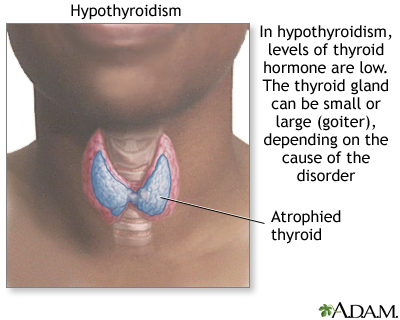The previous post already explain briefly what they thyroid gland is and it’s function.
This post will be discussing Hypothyroidism which is basically the opposite of Hyperthyroidism.
Hypothyroidism (underactive thyroid) is a condition in which the thyroid gland doesn’t produce enough of the thyroid hormones. Low levels of thyroid hormone interfere with the body’s ability to perform normal metabolic functions such as efficient use of energy from food products, regulation of many chemical reactions in the body, and maintenance of healthy cells, bones and muscles amongst other things.
Symptoms
It usually doesn’t cause symptoms in the early stages, but, over time, untreated hypothyroidism can cause a number of health problems, such as obesity, joint pain, infertility and heart disease. Other symptoms can include:
- increased sensitivity to cold
- constipation
- depression
- fatigue
- weakness
- heavier menstrual flow
- brittle hair and nails
In very severe cases, the following symptoms can occur:
- hoarseness
- puffiness of the face, hands, and feet
- slowed speech
- decreased taste and smell
- thin eyebrows
- thickened skin
- coma (called “myxedema coma”)
Causes
Autoimmune disease. Autoimmune disorders occur when your immune system produces antibodies that attack your own tissues. Sometimes this process involves your thyroid gland. People who develop a particular inflammatory disorder known as Hashimoto’s thyroiditis suffer from the most common cause of hypothyroidism.
Thyroid surgery. Removing all or a large portion of the thyroid gland can diminish or halt hormone production. In such cases thyroid hormone replacement is needed for life.
Radiation therapy. Radiation used to treat cancers of the head and neck can also affect the thyroid gland.
Treatment for hyperthyroidism. In some cases, treatment of hyperthyroidism can result in permanent hypothyroidism.
Side effect of other medications. A number of medications can contribute to hypothyroidism. For example lithium, which is used to treat certain psychiatric disorders.
Congenital disease. Some babies are born with a defective thyroid gland or no thyroid gland. In most cases, the thyroid gland didn’t develop normally for unknown reasons, but some children have an inherited form of the disorder.
Iodine deficiency. The trace mineral iodine is essential for the production of thyroid hormones. In some parts of the world, iodine deficiency is common, but the addition of iodine to table salt has helped greatly with this problem (which is why you always look out for the term “iodized salt” on packets of salt.)
Pregnancy. Some women develop hypothyroidism during or after pregnancy (postpartum hypothyroidism), often because they produce antibodies to their own thyroid gland. Left untreated, hypothyroidism increases the risk of miscarriage, premature delivery and preeclampsia. It can also seriously affect the developing fetus.
Diagnosis
As with every medical condition, it is always important to start with a detailed history and physical examination. And then laboratory tests to confirm the diagnosis.
Blood tests which can be done include:
- thyroid function tests: T4, T3RU and TSH
- tests for pituitary function: TSH
- cholesterol (can be elevated)
- CBC (may show anemia)
- liver enzymes (can be elevated)
- prolactin (can be elevated)
- electrolytes (sodium can be low)
In hypothyroidism, T4 is low and TSH is high. This means the pituitary is sending more TSH to stimulate the thyroid, but the thyroid does not respond. A low TSH indicates the pituitary may be the cause of hypothyroidism.
Treatment
Standard treatment for hypothyroidism involves daily use of the synthetic thyroid hormone levothyroxine (Levothroid, Synthroid, others). This oral medication restores adequate hormone levels, reversing the signs and symptoms of hypothyroidism. It also gradually lowers cholesterol levels elevated by the disease and may reverse any weight gain.
It may take time to determine the right dosage of levothyroxine initially, therefore the level of TSH should be checked after two to three months.
Side effects, such as: Increased appetite, Insomnia, Heart palpitations and shakiness may indicate hormone excess and should be reported to the doctor as soon as possible for an adjustment of dosage.
It is also important to note that diets rich in soy and high fiber can interfere with levothyroxine absorption. Certain medications and supplements also can reduce absorption. These include:
- calcium supplements
- iron supplements
- cholestyramine
- aluminum hydroxide (present in some antacids)






